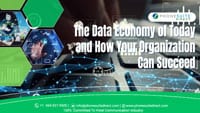
Difference Between Data Economy and Information Economy
The terms “data economy” and “information economy” are often used interchangeably, but they have distinct meanings and refer to different aspects of the digital landscape.
The data economy refers to the economic activity that is generated by the collection, storage, processing, and analysis of data. In today’s digital world, vast amounts of data are generated and collected from various sources such as social media, sensors, transactions, and online activities. This data can be valuable for businesses, governments, and individuals, as it can provide insights, drive decision-making, and enable the development of new products and services. The data economy encompasses activities like data mining, data analytics, data brokerage, and data-driven innovation. It involves the creation of value from raw data by extracting meaningful patterns, trends, and correlations.
On the other hand, the information economy focuses on the economic activities related to the production, distribution, and consumption of information goods and services. Information goods are intangible products that are based on knowledge, expertise, and intellectual property. Examples of information goods include software, music, e-books, online courses, and digital media. The information economy is driven by the exchange and monetization of these goods, often through digital platforms and networks. It encompasses industries such as software development, digital publishing, online education, and media streaming. The information economy is characterized by the production and dissemination of information-based products and services that are valuable to individuals, businesses, and society.
In summary, the data economy revolves around the collection and utilization of data for insights and decision-making, while the information economy focuses on the production and distribution of information goods and services. Both are integral components of the digital landscape and play significant roles in shaping the modern economy.
The Benefits Of Operating Data Economy
The data economy is quickly becoming the new normal for businesses of all sizes. By planning ahead and investing in a strong data strategy, companies can reap enormous benefits. Not only will a data-driven approach improve decision-making and create efficiencies, it could also unlock monetization opportunities that were previously unavailable.
Operating in the data economy allows organizations to better understand their customers, target audiences more effectively, optimize resources, and innovate faster while staying competitive – all key elements to sustaining long-term success.
Develop Your Data Leadership Skills
Managers today realize the importance of collecting, interpreting, and using data to make decisions that can improve the performance of their company. They understand the value of developing their data leadership skills in order to become more successful. Building data leadership skills requires focus in areas like analysis, communication, and problem-solving – three critical components for success.
With these skills, data leaders are able to identify important trends in their industry, detect relationships be
| call routing |
tween different pieces of information, create strategies for growth, and even forecast future outcomes with accuracy. Investing in developing data leadership skills can turn business goals into a reality and help organizations achieve success beyond their expectations.
Develop a Data Plan
When it comes to data plans, making sure you select the plan that best meets your needs is critical. Taking the time to compare different data plans and determine how much data you need each month can help save money and ensure you have enough data for all of your activities. There are many factors to consider such as monthly price, contracts, overage fees, additional features, and more.
Developing a data plan that takes into account all of these variables will help ensure that you don’t go over your budget while still allowing you access to the amount of data you need so that you can stay connected.
Have An Effective, Top-Down, & Data-Driven Culture
Creating an effective, top-down, data-driven culture is essential for any business that wants to grow and remain competitive in an ever-evolving market. Every successful organization needs reliable information and processes that can rapidly adapt and keep up with the times. By structuring departments, decisions, and objectives based on data, businesses benefit from a fluid framework that enables better decision-making, greater efficiency, and improved customer service.
With a data-driven structure in place, teams become more engaged and empowered to solve problems that arise quickly, often before they even become an issue. Not only does this foster stronger collaboration between departments – but it also creates a stronger bottom line by maintaining a competitive edge. If you’re looking to create an effective, data-driven culture within your business that will help drive success both now and into the future!
Plan A Tightly Managed, Collaborative, & Connected With It
The key to successful business execution is having a tightly managed plan that involves the collaborative buy-in and commitment of everyone involved. Making sure that all stakeholders are aware of their roles, and responsibilities and connected with each other throughout the duration of the project is not only important for reaching your desired outcomes but is essential for keeping morale high. By maintaining tight oversight and possessing a strong plan with everyone connected, you can make certain that your project will be carried out successfully!
Build With Infrastructure That’s Scalable, and Interoperable
Building an infrastructure that is both scalable, interoperable, and collaborative is the key to creating a foundation for success. By investing in such an infrastructure, businesses can streamline workloads, collaborate with ease across departments or globally, and access data between applications in real time. Furthering scalability and collaboration not only strengthens relationships and operations internally within organizations but also bolsters the capability to take on growing customer demands with agility.
When reimagining current operations or preparing for growth, choosing to build a scalable, interoperable, and collaborative infrastructure is essential in leading the charge into the future of business.
The Benefits Of Operating Information Economy
Operating within the information economy offers several benefits to businesses, individuals, and society. Here are some key advantages of participating in the information economy:
-
Access to Knowledge and Information:
The information economy provides easy access to a wide range of knowledge and information resources. Individuals and businesses can access educational materials, research publications, news, and other valuable information online. This accessibility promotes continuous learning, skill development, and informed decision-making.
-
Job Creation and Economic Growth:
The information economy has created numerous job opportunities and contributed to economic growth. Industries such as software development, digital publishing, online education, and media streaming have experienced significant expansion, leading to job creation and entrepreneurial opportunities. The information economy also fosters innovation and drives productivity, contributing to overall economic development.
-
Global Market Reach:
Digital platforms and the internet have enabled businesses to reach global audiences with their information-based products and services. Online marketplaces, e-commerce platforms, and digital distribution channels have eliminated geographical barriers, allowing businesses to expand their customer base and tap into new markets worldwide.
-
Collaboration and Networking:
The information economy facilitates collaboration and networking among individuals and businesses. Online platforms, social media, and digital communities provide opportunities for knowledge sharing, idea exchange, and collaboration on projects. This fosters innovation, encourages partnerships, and promotes collective problem-solving.
-
Customization and Personalization:
The information economy allows businesses to provide customized and personalized experiences to their customers. Through data analysis and targeted marketing techniques, businesses can tailor their products, services, and communication to meet individual preferences and needs. This enhances customer satisfaction and fosters long-term relationships.
-
Efficiency and Cost Savings:
Digital technologies and automation in the information economy have the potential to improve efficiency and reduce costs for businesses. Streamlined processes, digital workflows, and online collaboration tools can enhance productivity, optimize resource allocation, and reduce operational expenses. This enables businesses to operate more effectively and competitively.
-
Democratization of Information:
The information economy has democratized access to information and knowledge. It has empowered individuals to share their expertise, opinions, and creativity through blogs, social media, and other digital platforms. This free flow of information has led to diverse voices being heard, increased public participation, and the dissemination of alternative viewpoints.
Give Us A Call
You’re in the right place if you need help managing your small business system. We have been providing services to businesses across America and can’t wait until we get started! Give us a call at Phonesuite Direct to learn more about how our expert team will support all aspects of setting up this essential lifeline for running any successful enterprise today, & tomorrow. Give us a call so that we can set you on the path to success!



